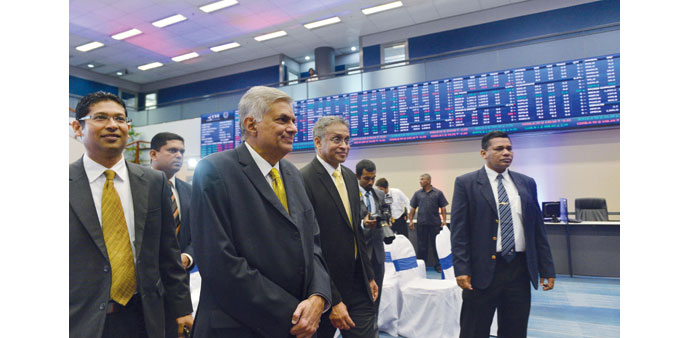Sri Lanka’s Prime Minister Ranil Wickremesinghe, third left, arrives for the 30th anniversary of the Colombo Stock Exchange ceremony in Colombo yesterday. The small Colombo bourse has been falling since the new government came to power earlier this year.
IANS
Colombo
Sri Lanka’s parliament yesterday passed the second reading of the government’s budget for 2016 with an overwhelming two-thirds majority.
This was the first budget of Sri Lanka’s new government that was formed early this year, Xinhua reported.
The budget vote, which was taken up yesterday evening, saw 159 lawmakers voting in favour and 52 voting against.
Sri Lankan President Maithripala Sirisena, who is the leader of the Sri Lanka Freedom Party, a partner in the country’s unity government, thanked all lawmakers who voted in favour of the budget.
Earlier, Prime Minister Ranil Wickremesinghe said the government will seek a bailout from the International Monetary Fund (IMF) next year as global economic conditions are set to be unstable.
“I think it is prudent in the circumstance of all the international developments that we start discussing a stand by arrangement with the IMF,” Wickremesinghe told
parliament.
“Generally I would not have done it, but I told the finance minister to discussing with the IMF. If a difficult time comes, we will have to be prepared and we should try to reduce the
burden on the people.”
The IMF also has a precautionary facility but a standby loan is the classic bailout loan. The ousted Mahinda Rajapakse regime had to be bailed out twice by the IMF.
In 2009 Sri Lanka was hit by property bubble, fuel subsidy credits and a run by foreign investors on Sri Lanka rupee bonds and in 2011 it was money printed to support fuel subsidies that generated the balance of payments crisis.
The current crisis was caused mostly by money printed to pay state salaries and to keep interest rates down which also triggered foreign investor outflows.
Sri Lanka had already borrowed $1.1bn from Reserve Bank of India. But unlike IMF loans there is no requirement to follow prudent monetary or fiscal policy to correct the underlying problems that is triggering the balance of payments pressure.
A steep salary increase to state workers last year had given a body blow to Sri Lanka’s government finances and the budget 2016 has slapped a series of taxes on the people to pay the bloated wage bill and other
subsidies.
Wickremesinghe said Sri Lanka’s budget deficit of 5.9% for 2016 has been viewed as negative and he hoped to bring it down to 5.5%.
He said the new administration had not abandoned the path to fiscal consolidation.

